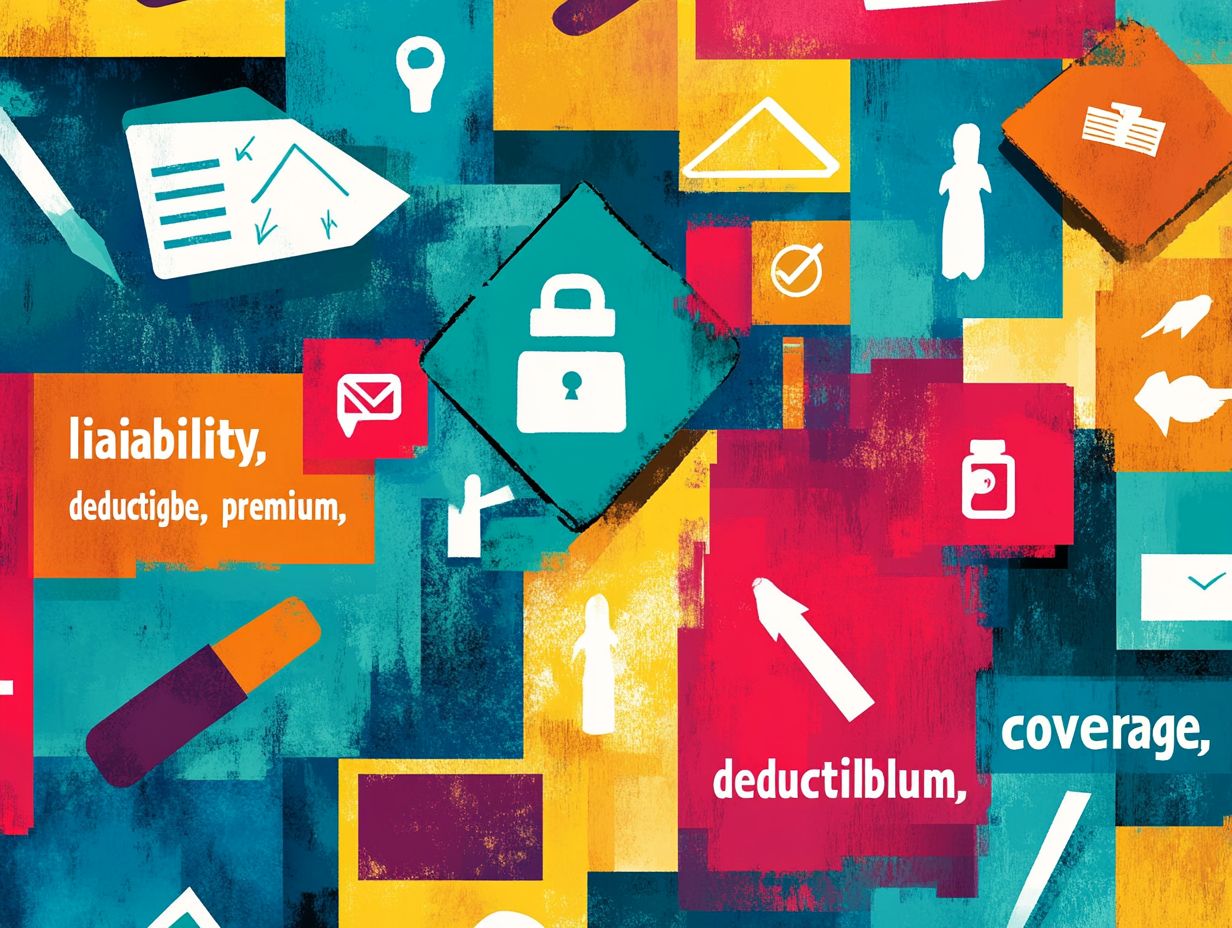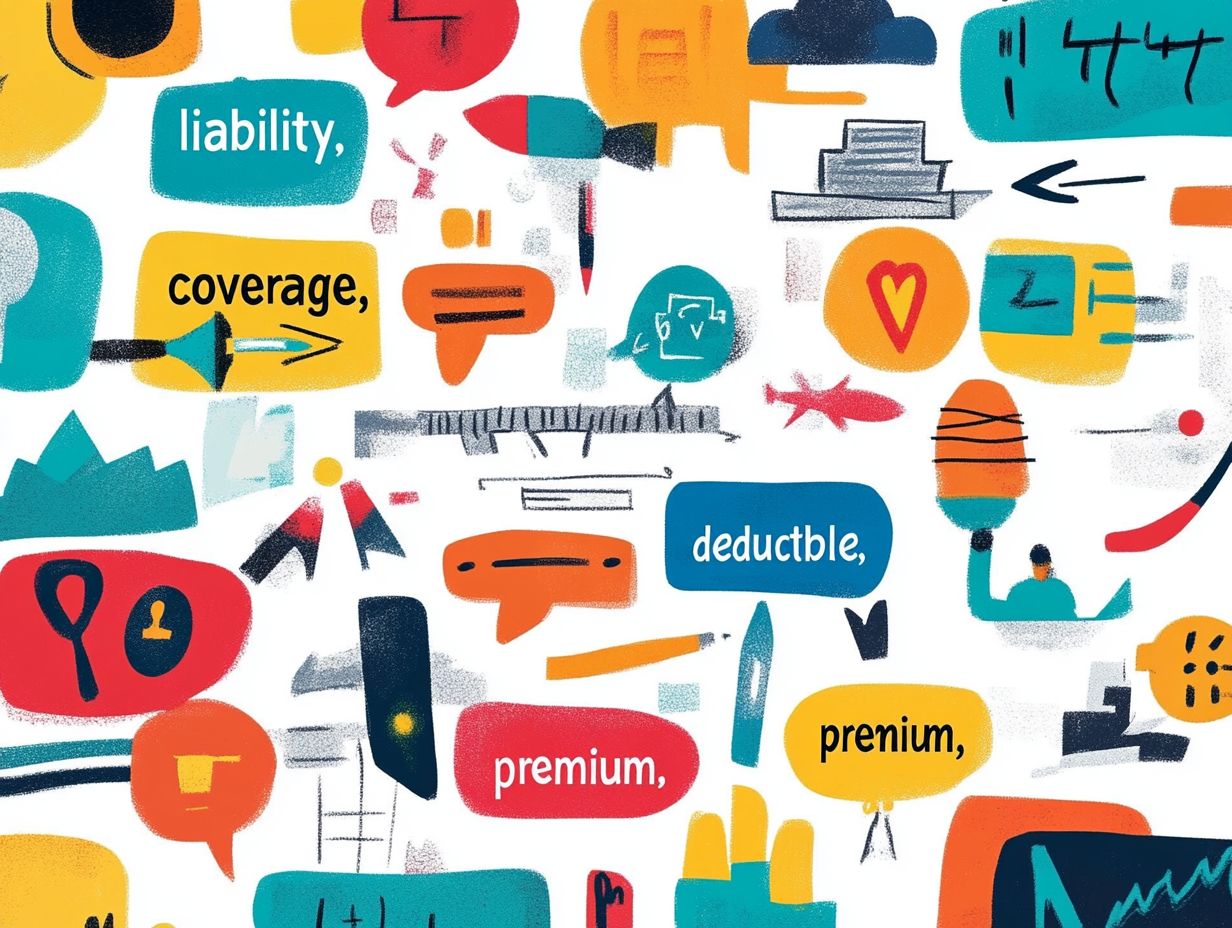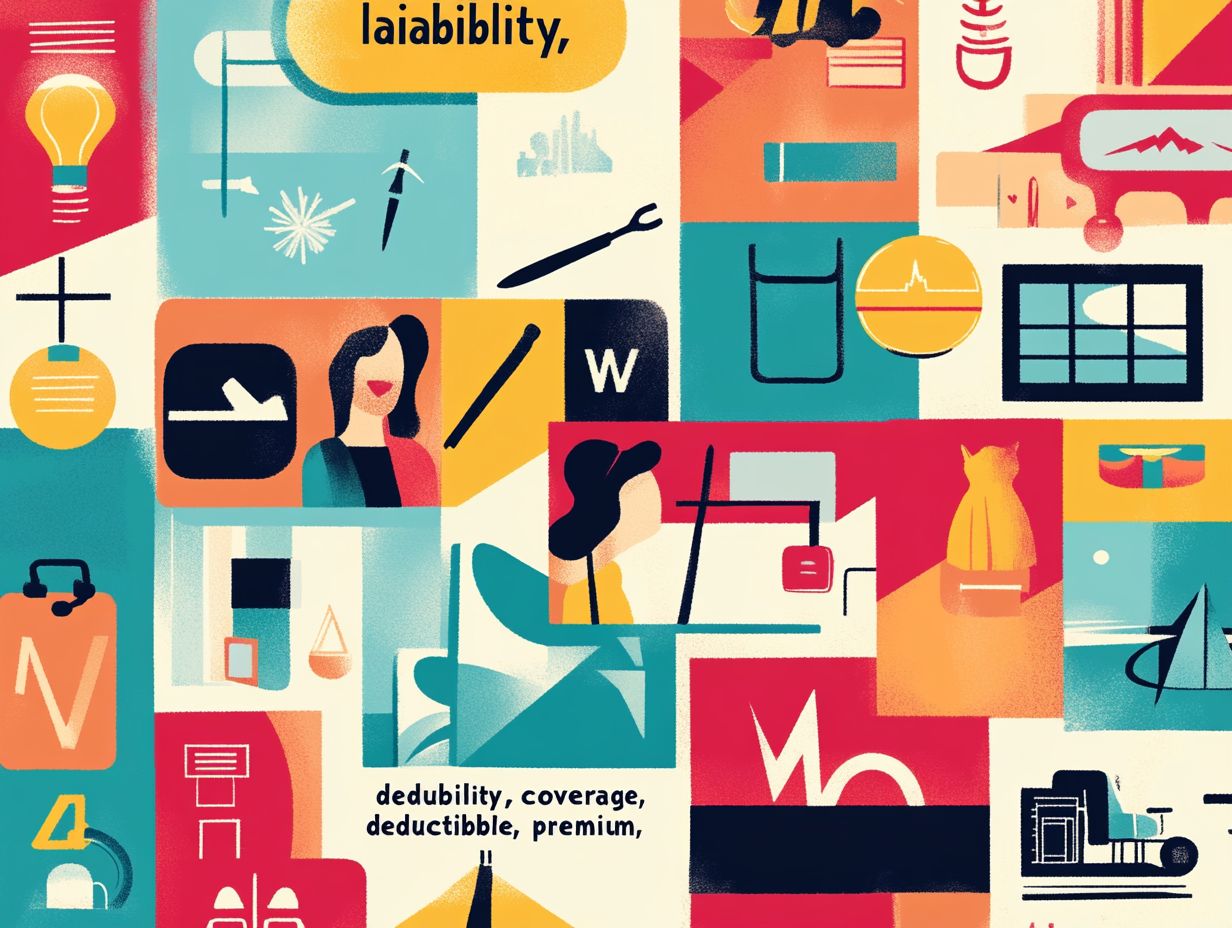Freelancer Insurance: Key Terms You Should Know
In today s gig economy, freelancers are reshaping the job landscape. However, with that flexibility comes a set of unique risks, particularly regarding insurance, that you need to be aware of.
Understanding your insurance options is crucial to protect your income. This guide helps you navigate the various types of insurance available such as health, liability, and disability insurance policies that are tailored specifically for freelancers.
It will clarify essential terms you should know, like premiums and deductibles (the amount you pay out of your pocket before your insurance starts covering costs), and provide valuable tips for selecting the right insurance plan to suit your needs.
Dive in and discover how to safeguard yourself as you navigate the dynamic world of freelancing.
Contents
Key Takeaways:

- Freelancer insurance provides protection for self-employed individuals.
- Health, liability, and disability insurance are important types of coverage for freelancers.
- Knowing key terms like premium, deductible, co-pay, and out-of-pocket maximum can help freelancers choose the best insurance plan for their needs.
Understanding Freelancer Insurance
Freelancer insurance is a vital component of financial protection for self-employed individuals. It allows you to reduce risks related to your job.
Without the safety net of traditional employment benefits, it’s essential for you to understand the various insurance policy options available to secure your livelihood. This coverage includes a range of tailored options addressing the unique needs of freelancers across different industries, from professional liability insurance to health insurance policies.
Insurance companies and specialists can assist you in navigating the complex landscape of coverage options, empowering you to make informed decisions that guarantee both financial stability and peace of mind.
What is Freelancer Insurance?
Freelancer insurance encompasses a variety of policies crafted to provide financial security for self-employed individuals. It shields them from unforeseen risks and liabilities.
In today s fiercely competitive environment, you often juggle multiple responsibilities. The protection offered by this insurance is absolutely invaluable.
Typically, coverage includes various forms, such as general liability insurance, which safeguards you against claims of property damage or bodily injury, and health insurance, essential for protecting against unexpected medical expenses.
The insurance market also presents additional options like professional liability insurance, which is especially important for those of you offering services or advice. By investing in these policies and avoiding common mistakes in freelancer insurance selection, you can navigate your freelance career with enhanced peace of mind, knowing you’re safeguarded against uncertainties that could lead to significant financial repercussions.
Types of Freelancer Insurance
Grasping the various types of freelancer insurance is essential for self-employed individuals like you. This knowledge can serve as a vital shield against the myriad risks and liabilities that come with your professional journey.
Health Insurance
Health insurance is crucial for freelancers like you. It provides coverage for medical expenses and ensures you have access to necessary healthcare and outpatient services without the burden of overwhelming costs.
Given the unpredictable nature of freelance income, finding options tailored to your individual needs can significantly reduce financial stress. The insurance marketplace presents a range of plans, from high-deductible health plans that might be more budget-friendly upfront to comprehensive coverage that includes preventive care. Freelancers should consider exploring 10 essential insurance types for freelancers to ensure they are adequately protected.
Whether you re considering short-term health insurance for transitional periods or long-term policies that offer broader hospitalization and specialist access, it’s essential for you to understand your choices.
Ultimately, securing reliable health insurance not only protects you from unexpected medical expenses but also fosters peace of mind. This allows you to focus on your work without the looming worry of healthcare costs.
Liability Insurance

Liability insurance protects you as a freelancer from potential claims related to your work. It’s vital to understand both professional and general liability coverage as you navigate your freelance journey.
Professional liability insurance shields you from claims of negligence, errors, or omissions in your services. This coverage allows you to focus on delivering exceptional work without the constant worry of expensive litigation.
General liability coverage protects you from claims related to accidents, injuries, or damages that may occur during your business operations.
Having both types of coverage is essential. It gives you a strong protection plan that reduces your financial vulnerability in various situations, such as client disputes or unexpected workplace mishaps that could lead to significant property damage. For more insights on this topic, check out our freelancer insurance FAQs answered.
Disability Insurance
Disability insurance provides income replacement if you can’t work due to illness or injury. It ensures that your financial security remains intact during challenging times.
Think of this insurance as your financial safety net. It allows you to focus on recovery without the stress of lost income. Unlike traditional employees who enjoy sick leave, freelancers must rely on savings during periods of incapacity. Incorporating insurance as a freelancer into your coverage helps protect your livelihood from unforeseen circumstances.
This coverage is your lifeline during tough times. It not only addresses your immediate financial needs but also contributes to your long-term stability. This makes it a vital element of your insurance policy, especially for personal planning.
With this layer of protection, you can significantly enhance your overall peace of mind. Pursue your passions without the looming fear of financial ruin.
Essential Insurance Terms
Grasping key insurance terms is vital as you navigate the insurance market. Understanding coverage categories and available options greatly influences your selection of policies and overall financial protection.
Premium
The premium (the amount you pay for your insurance policy) varies depending on your chosen coverage levels and specific options, including factors like your driving history and MVR (Motor Vehicle Record).
Several factors influence this variability: the type of coverage you select, your health status, age, and even where you live, along with your claims history. For example, choosing comprehensive coverage with perks like roadside assistance or rental car reimbursement typically results in a higher premium than a basic liability policy.
Likewise, a younger driver may face higher costs due to the perceived risk associated with their age group. A homeowner in a flood-prone area might find their coverage against natural disasters comes at a higher price. Understanding these factors empowers you to make informed decisions that align your insurance needs with your budget. Additionally, for freelancers, exploring the benefits of having insurance can be crucial for financial security.
Deductible
The deductible is the amount you must pay out-of-pocket before your insurance policy starts covering expenses. It plays a crucial role in the claims process.
Understanding how deductibles work is essential for navigating the often complex world of insurance. It directly impacts how much you pay when filing a claim, as it represents the portion of the expense you’re responsible for before insurance coverage kicks in. A higher deductible might lower your monthly premiums, but it also means you’ll cover a larger initial cost when a claim arises.
Grasping the implications of deductibles can significantly influence your overall financial planning. It leads to more informed choices in selecting the right insurance policy.
Co-pay

A co-pay is a fixed amount you pay for specific health services at the time you receive care, designed to help you manage healthcare costs within your insurance policy.
This system helps control costs. For instance, if you have a co-pay of $20 for a routine doctor’s visit, it simplifies budgeting for your regular check-ups.
However, if your health insurance plan has higher co-pays for specialist visits or emergency services, this can significantly sway your decision on whether to seek care.
Over time, these out-of-pocket expenses can add up, affecting overall healthcare affordability and potentially leading to deferred care. This underscores the delicate balance between managing costs and accessing the medical services you need.
Out-of-Pocket Maximum
The out-of-pocket maximum serves as your financial safety net, setting a definitive limit on what you ll spend for covered healthcare services each year, protecting you from unexpected medical costs that could lead to substantial financial loss. This protection is invaluable in today’s ever-changing healthcare landscape.
Establishing a clear cap on expenses gives you the power to budget effectively, allowing you to plan your finances with confidence, knowing that you won t be overwhelmed by a mountain of bills. Once you hit that out-of-pocket maximum, all covered services are generally paid at 100%, meaning you won t face any additional costs for the rest of the year.
This feature not only eases the burden of paying for care but also encourages you to seek out necessary medical services without the looming fear of financial strain.
Choosing the Right Insurance Plan
Choosing the right insurance plan is crucial for freelancers like you! It demands careful consideration of various factors to ensure you secure adequate protection and coverage tailored to your unique needs.
Taking the time to evaluate your options will empower you to make a choice that safeguards your interests and supports your freelance journey.
Factors to Consider
When selecting an insurance plan, freelancers like you must weigh various factors, including the available insurance options, coverage benefits, and premium costs, to discover a policy that truly suits your specific needs.
You should evaluate your individual risks based on your industry and the types of projects you undertake, as these can greatly influence the coverage you require. Engaging with insurance specialists can offer you tailored advice, ensuring that the plan you choose aligns perfectly with your unique circumstances. Additionally, consider exploring freelancer liability insurance to better protect yourself.
It’s also crucial for you to fully grasp the implications of your choices, such as potential out-of-pocket expenses and the claims processes. By conducting thorough research and asking insightful questions, you can sidestep pitfalls and secure a policy that not only safeguards your business but also brings you peace of mind.
Frequently Asked Questions
What is freelancer insurance?

Freelancer insurance is a type of insurance that is designed specifically for self-employed individuals who work as independent contractors, freelancers, or consultants.
What are the key terms to know when it comes to freelancer insurance?
Some key terms to know when it comes to freelancer insurance include liability coverage, professional liability insurance, and business owner’s policy.
What is liability coverage?
Liability coverage is a type of insurance that protects you in case you are sued by a client or third party for damages or injuries related to your work.
What is professional liability insurance?
Professional liability insurance, also known as Errors & Omissions insurance, is a type of insurance that protects you in case you make a mistake or provide inadequate services that result in financial loss for your client.
Take the first step! Review your insurance options today.
What is a Business Owner’s Policy (BOP)?
A Business Owner’s Policy, or BOP, is a form of insurance that combines general liability insurance and property insurance into one package.
This policy covers both liability and property-related claims.
Why is Freelancer Insurance Important?
Freelancer insurance protects your business and personal assets.
It gives you peace of mind, allowing you to focus on your work without the stress of potential legal or financial risks.






